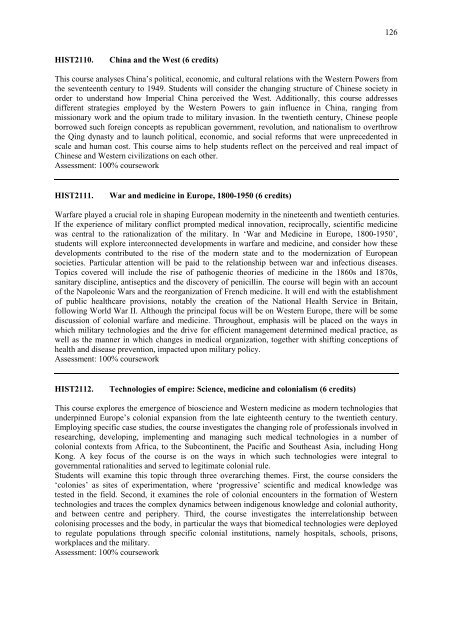(BA) (4-year-programme) - The University of Hong Kong
(BA) (4-year-programme) - The University of Hong Kong
(BA) (4-year-programme) - The University of Hong Kong
Create successful ePaper yourself
Turn your PDF publications into a flip-book with our unique Google optimized e-Paper software.
126HIST2110.China and the West (6 credits)This course analyses China’s political, economic, and cultural relations with the Western Powers fromthe seventeenth century to 1949. Students will consider the changing structure <strong>of</strong> Chinese society inorder to understand how Imperial China perceived the West. Additionally, this course addressesdifferent strategies employed by the Western Powers to gain influence in China, ranging frommissionary work and the opium trade to military invasion. In the twentieth century, Chinese peopleborrowed such foreign concepts as republican government, revolution, and nationalism to overthrowthe Qing dynasty and to launch political, economic, and social reforms that were unprecedented inscale and human cost. This course aims to help students reflect on the perceived and real impact <strong>of</strong>Chinese and Western civilizations on each other.Assessment: 100% courseworkHIST2111.War and medicine in Europe, 1800-1950 (6 credits)Warfare played a crucial role in shaping European modernity in the nineteenth and twentieth centuries.If the experience <strong>of</strong> military conflict prompted medical innovation, reciprocally, scientific medicinewas central to the rationalization <strong>of</strong> the military. In ‘War and Medicine in Europe, 1800-1950’,students will explore interconnected developments in warfare and medicine, and consider how thesedevelopments contributed to the rise <strong>of</strong> the modern state and to the modernization <strong>of</strong> Europeansocieties. Particular attention will be paid to the relationship between war and infectious diseases.Topics covered will include the rise <strong>of</strong> pathogenic theories <strong>of</strong> medicine in the 1860s and 1870s,sanitary discipline, antiseptics and the discovery <strong>of</strong> penicillin. <strong>The</strong> course will begin with an account<strong>of</strong> the Napoleonic Wars and the reorganization <strong>of</strong> French medicine. It will end with the establishment<strong>of</strong> public healthcare provisions, notably the creation <strong>of</strong> the National Health Service in Britain,following World War II. Although the principal focus will be on Western Europe, there will be somediscussion <strong>of</strong> colonial warfare and medicine. Throughout, emphasis will be placed on the ways inwhich military technologies and the drive for efficient management determined medical practice, aswell as the manner in which changes in medical organization, together with shifting conceptions <strong>of</strong>health and disease prevention, impacted upon military policy.Assessment: 100% courseworkHIST2112.Technologies <strong>of</strong> empire: Science, medicine and colonialism (6 credits)This course explores the emergence <strong>of</strong> bioscience and Western medicine as modern technologies thatunderpinned Europe’s colonial expansion from the late eighteenth century to the twentieth century.Employing specific case studies, the course investigates the changing role <strong>of</strong> pr<strong>of</strong>essionals involved inresearching, developing, implementing and managing such medical technologies in a number <strong>of</strong>colonial contexts from Africa, to the Subcontinent, the Pacific and Southeast Asia, including <strong>Hong</strong><strong>Kong</strong>. A key focus <strong>of</strong> the course is on the ways in which such technologies were integral togovernmental rationalities and served to legitimate colonial rule.Students will examine this topic through three overarching themes. First, the course considers the‘colonies’ as sites <strong>of</strong> experimentation, where ‘progressive’ scientific and medical knowledge wastested in the field. Second, it examines the role <strong>of</strong> colonial encounters in the formation <strong>of</strong> Westerntechnologies and traces the complex dynamics between indigenous knowledge and colonial authority,and between centre and periphery. Third, the course investigates the interrelationship betweencolonising processes and the body, in particular the ways that biomedical technologies were deployedto regulate populations through specific colonial institutions, namely hospitals, schools, prisons,workplaces and the military.Assessment: 100% coursework
















